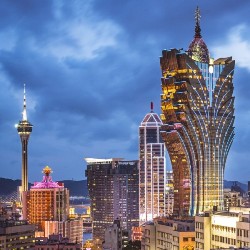Macau Casinos Still A Risky Bet For Investors

In mid-July, there was a glimmer of hope that Macau’s beleaguered casino interest might finally be on the mend after Sands China, based in the once-bustling resort area, spurred optimism by sharing that it had positive growth for the first time in two years.
As a result, investor interest in Macau’s casino industry caused stock prices to climb once more, leading to the first rally in months. Stocks in Sands China then rose 6 percent in the midst of the excitement, allowing it to gain 19 percent overall for the month. The resort wasn’t the only one that benefited, however, as Wynn Macau stock prices increased by 21 percent, while Galaxy Entertainment Group saw their stock prices boosted by 6 percent on Tuesday, July 26, 2016.
It all sounds like good news, right? Industry analysts aren’t so sure.
Too Soon to Tell, Experts Say
In interviews, those who are well acquainted with the Chinese enclave’s gambling industry stated that one month of revenue results was a positive sign, but not enough to indicate that things were truly turning around in Macau. One expert went on record as saying that 2 or 3 months of positive growth would be needed to confirm that we are actually looking at a real recovery.
Mid-October is usually one of the busiest tourist traveling times in China, as it is when the golden week festival is held. Many experts are saying that it will be necessary to now wait until November to accurately gauge the health of Macau’s gambling industry, and how the casinos have fared during what should be their busiest time of year.
What Led to the Problem?
How did the situation become so bleak for China’s only regulated gambling resort.
To find the answers, it’s necessary to look back to 2014. That’s when the Chinese government vowed to root out corruption, hoping to save face during a time of economical turmoil. While Macau has always been a popular destination for tourists, those supporting the casinos there have historically been China’s elite. Many of these individuals, however, ended up being targeted by the anti-corruption campaigns, and this subsequently led to a sharp decline in VIP clientele visiting the casinos.
The latest news from the area’s casinos seems to indicate that even though they are becoming profitable again, the VIP sector has yet to return in record numbers. Afraid of becoming scrutinized by the government, the former high rollers with plenty of disposable income are remaining at home rather than visiting Macau’s numerous casinos.
Industry analysts strongly doubt that the Macau casino industry can be profitable over the long term without a resurgence in VIP traffic, and with the Chinese government not likely to take a softer stance on corruption any time soon, it’s easy to see why many experts are recommending that investors proceed with caution.
At the same time, tourism figures from the region are encouraging. In June 2016, 2.4 million more people visited the area than did in 2015, and the number of travelers who stayed overnight rose by 13.9 percent.
Only time will tell whether June was a fluke or part of a larger trend for Macau’s casinos.
Return To Growth in 2017
Meanwhile, experts have forecast Macau returning to growth in 2017, with the number of tourists and recreational gamblers visiting the island resort expected to increase. As Fernando Chui, Chief Executive of Macau, explains:
“Macau’s gaming industry and the whole economy will continue to adjust, but the decline may shrink to 7.2 percent this year and even resume growth in 2017. It’s a good time for Macau to re-position after a 25-month gaming revenue drop.”
In addition, Chui stated that Macau is trying to extend its attractions beyond just gambling, and is aiming to raise its casinos’ non-gaming revenue from their 2014 level of 6.6% to 9% by 2020. In August, for instance, the $4.1 billion Wynn Palace is expected to open for business, complete with 1,700 guest rooms, 1,000 fountain jets, and a 10-minute gondola ride around the lagoon. Commenting on the policies of Beijing, Steve Wynn, said:
“The policies of the central government are only tangentially important to us because we’re in the middle of delivering a service. In the long run, the economy of China is going to affect all my customers and their ability to recreate, but on a day-to-day basis it’s not part of our script, it’s far away from us compared with the demands of the moment.”







